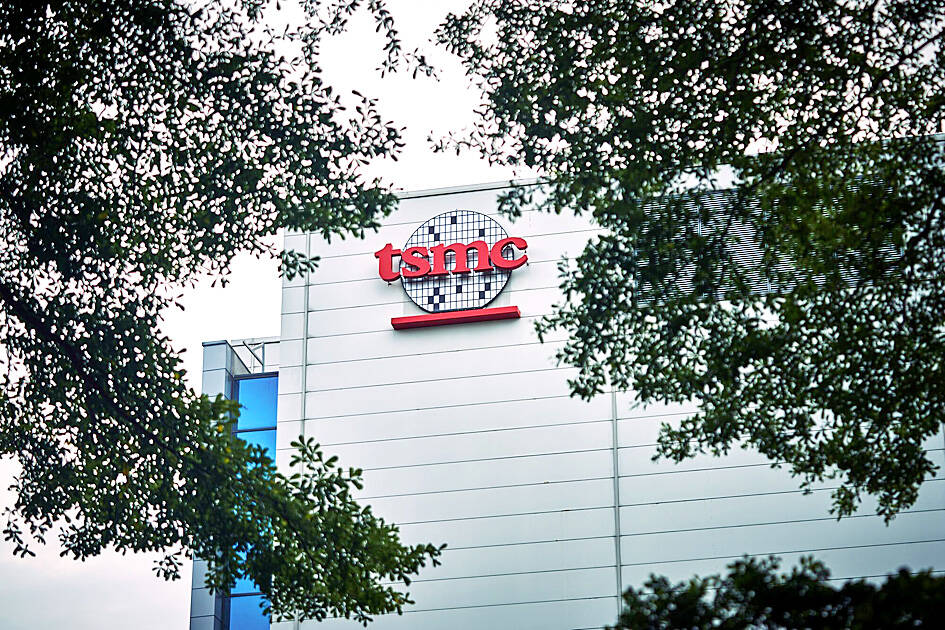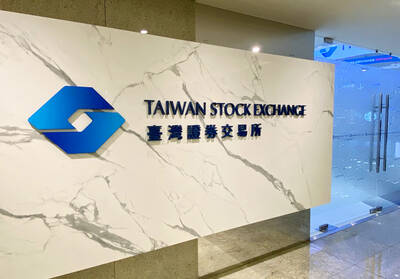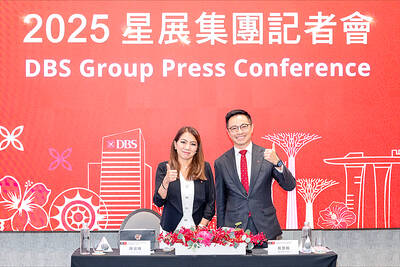Taiwan Semiconductor Manufacturing Co (TSMC, 台積電) is planning to build more plants in Europe with a focus on the market for artificial intelligence (AI) chips as the chipmaker expands its global footprint, a senior Taiwanese official said.
“They have started construction of the first fab in Dresden; they are already planning the next few fabs in the future for different market sectors as well,” National Science and Technology Council (NSTC) Minister Wu Cheng-wen (吳誠文) told Bloomberg TV in an interview that aired yesterday.
Wu did not specify a timeline for TSMC’s further expansion in Europe.

Photo: An Rong Xu, Bloomberg
TSMC in an e-mailed statement said it remains focused on its global expansion projects and has no new investment plans at this time.
TSMC, which is the world’s biggest chipmaker and produces most of its semiconductors in Taiwan, is spending tens of billions of dollars to set up new sites in the US, Japan and Germany, partly to hedge against rising geopolitical tensions with China.
It broke ground in August on a 10 billion euros (US$10.93 billion) chip fabrication plant in Germany’s Dresden for what is to be its first factory in the EU. About half of the funding for that project would be covered by state subsidies, with production slated to start by the end of 2027.
The AI market, including chips for US-based Nvidia Corp and Advanced Micro Devices Inc, would be the most important segment, while other semiconductor companies with alternative designs might also offer opportunities for TSMC, Wu said.
“Maybe they can work on the European market as well, so TSMC is looking for that for planning their next few fabs,” he said, adding that the company would need to evaluate whether to expand in Dresden or to build in other parts of the EU.
While established European chipmakers including NXP Semiconductors NV and Infineon Technologies AG are focused mostly on mature technologies for the industrial and automotive sectors, a number of next-generation chip designers have emerged in Europe, including Germany’s Black Semiconductor GmbH and Axelera AI in the Netherlands.
TSMC’s overseas factories are also creating opportunities for countries and cities nearby to secure investments from its suppliers. For the Dresden site, the Czech Republic appears to emerge as a winner as Prague and Taipei have deepened their relations in recent years.
The government is considering support for TSMC suppliers to invest in a Czech location that is close to Dresden, Wu said.
He said he is also seeking to facilitate joint research and development programs for academics in Taiwan and the Czech Republic.
Prague has official diplomatic relations with Beijing, but it has been forging closer trade and informal ties with Taipei. Several senior Taiwanese officials, including Wu, have traveled to the Czech Republic over the past year. Former president Tsai Ing-wen (蔡英文) is also visiting the country as the first stop of her European trip.
Separately, Wu said he expects Taiwanese chip firms to face further pressure to expand in the US regardless of the outcome of the presidential election next month. TSMC has so far pledged more than US$65 billion to create three plants in Arizona.
“Short term, maybe it is painful for Taiwanese companies, because it is more expensive if they move over there,” he said. “But in the long run, maybe it is good for them, from my point of view, because they can improve themselves.”

Taiwan Semiconductor Manufacturing Co (TSMC, 台積電) secured a record 70.2 percent share of the global foundry business in the second quarter, up from 67.6 percent the previous quarter, and continued widening its lead over second-placed Samsung Electronics Co, TrendForce Corp (集邦科技) said on Monday. TSMC posted US$30.24 billion in sales in the April-to-June period, up 18.5 percent from the previous quarter, driven by major smartphone customers entering their ramp-up cycle and robust demand for artificial intelligence chips, laptops and PCs, which boosted wafer shipments and average selling prices, TrendForce said in a report. Samsung’s sales also grew in the second quarter, up

LIMITED IMPACT: Investor confidence was likely sustained by its relatively small exposure to the Chinese market, as only less advanced chips are made in Nanjing Taiwan Semiconductor Manufacturing Co (TSMC, 台積電) saw its stock price close steady yesterday in a sign that the loss of the validated end user (VEU) status for its Nanjing, China, fab should have a mild impact on the world’s biggest contract chipmaker financially and technologically. Media reports about the waiver loss sent TSMC down 1.29 percent during the early trading session yesterday, but the stock soon regained strength and ended at NT$1,160, unchanged from Tuesday. Investors’ confidence in TSMC was likely built on its relatively small exposure to the Chinese market, as Chinese customers contributed about 9 percent to TSMC’s revenue last

Taiwan and Japan will kick off a series of cross border listings of exchange-traded funds (ETFs) this month, a milestone for the internationalization of the local ETF market, the Taiwan Stock Exchange (TWSE) said Wednesday. In a statement, the TWSE said the cross border ETF listings between Taiwan and Japan are expected to boost the local capital market’s visibility internationally and serve as a key for Taiwan becoming an asset management hub in the region. An ETF, a pooled investment security that is traded like an individual stock, can be tracked from the price of a single stock to a large and

Despite global geopolitical uncertainties and macroeconomic volatility, DBS Bank Taiwan (星展台灣) yesterday reported that its first-half revenue rose 10 percent year-on-year to a record NT$16.5 billion (US$537.8 million), while net profit surged 65 percent to an unprecedented NT$4.4 billion. The nation’s largest foreign bank made the announcement on the second anniversary of its integration with Citibank Taiwan Ltd’s (花旗台灣) consumer banking business. “Taiwan is a key market for DBS. Over the years, we have consistently demonstrated our commitment to deepening our presence in Taiwan, not only via continued investment to support franchise growth, but also through a series of bolt-on acquisitions,” DBS